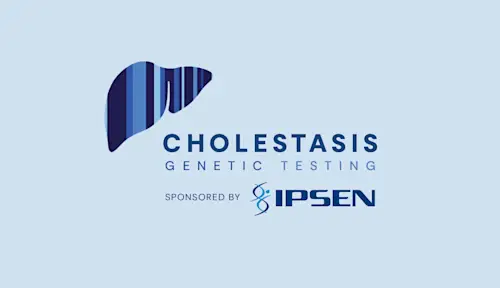The Ipsen-Sponsored Cholestasis Genetic Testing Program
Sponsored, no-cost genetic testing
US

What is the Cholestasis Genetic Testing Program?
The Cholestasis Genetic Testing Program, sponsored by Ipsen, provides access to free, comprehensive cholestatic genetic testing for eligible individuals* suspected of having progressive familial intrahepatic cholestasis (PFIC) or Alagille syndrome (ALGS).
Genetic Cholestatic Liver Disorders
- A growing number of cholestatic liver diseases have been found to have a genetic component, with genetic cholestatic liver diseases presenting during both childhood and adulthood.4,5
- Both PFIC and ALGS are rare genetic cholestatic liver diseases with cholestasis, one of the most common manifestations of ALGS and PFIC.1,6
PFIC - PFIC is a spectrum of rare genetic disorders involving the liver,2 occurring in an estimated 1 out of every 50,000-100,000 births worldwide3
- It commonly presents in the first months of life; however, variants in PFIC genes ABCB4, ABCB11, and ATP8B1 can contribute to later-onset forms of the disease4,5
- Untreated, PFIC can lead to liver damage and the need for liver transplantation3,4
ALGS - ALGS is one of the most common causes of inherited cholestasis in children,6 occurring in an estimated 1 out of every 30,000-45,000 births7
- The clinical manifestation of ALGS can range from a silent disease phenotype with no symptoms to severe, life-threatening cardiovascular involvement and/or advanced liver disease8,9
Program eligibility
*Eligible individuals will meet the inclusion criteria below
This program is available to patients that meet the following criteria:
- Patient resides in the United States
- Patient is not already diagnosed with an extrahepatic disorder (e.g., biliary atresia)
And meet one of two criteria below: - Patient is currently cholestatic or has a history of cholestasis without an identified cause
- Patient presents with an unexplained chronic liver disease (i.e., jaundice or changes in liver function tests)
Testing options
This program offers testing with a choice of three Ipsen-Sponsored Cholestasis Panels
Note: Re-requisitions are not available through this sponsored testing program
Ipsen Pediatric Cholestasis Panel (110 genes)
ABCB11, ABCB4, ABCC2, ABCD3, ABCG5, ABCG8, ACOX2, ADK, AKR1D1, ALDOB, ALG1, ALG8, AMACR, ANKS6, AP1S1, ASS1, ATP6AP1, ATP7B, ATP8B1, B4GALT1, BAAT, BCS1L, BLVRA, CC2D2A, CCDC115, CFTR, CLDN1, COG6, COG7, CYP27A1, CYP7B1, C19orf70 (MICOS13), DCDC2, DGUOK, DHCR7, FAH, FH, G6PD, GALE, GALT, GFM1, GLIS3, HADHA, HADHB, HFE, HJV, HSD17B4, HSD3B7, IARS (IARS1), INVS, JAG1, KIF12, LIPA, LSR, MKS1, MPV17, MYO5B, NEK8, NOTCH2, NPC1, NPC2, NPHP1, NPHP3, NPHP4, NR1H4, PEX1, PEX10, PEX11B, PEX12, PEX13, PEX14, PEX16, PEX19, PEX2, PEX26, PEX3, PEX5, PEX6, PEX7, PKHD1, POLG, POMC, PPM1F, RFX6, SC5D, SCYL1, SERAC1, SERPINA1, SHPK, SLC10A2, SLC25A13, SLC25A20, SLC40A1, SLC51B, SMPD1, TALDO1, TBX19, TFAM, TFR2, TJP2, TMEM216, TRMU, TTC26, TWNK, UGT1A1, USP53, UTP4, VIPAS39, VPS33B, WDR83OS
Ipsen Adult Cholestasis Panel (47 genes)
ABCB11, ABCB4, ACOX1, AKR1C4, ALAS2, APOA5, ARG1, ATP7B, ATP8B1, CDAN1, CFTR, CLPX, CREB3L3, CTNS, DGUOK, FECH, GLI2, HFE, HJV, HNF1B, ITCH, JAG1, KIF12, KMT2D, MMACHC, MYO5B, NOTCH2, NR1H4, OTC, PKD1L1, SCP2, SERPINA1, SLC22A5, SLC25A15, SLC27A5, SLC30A10, SLC40A1, SMS, STXBP2, TFR2, TJP2, TRAPPC11, TSFM, UGT1A1, USP53, VMA21, VPS33B
Ipsen Combined Cholestasis Panel (137 genes)
ABCB11, ABCB4, ABCC2, ABCD3, ABCG5, ABCG8, ACOX1, ACOX2, ADK, AKR1C4, AKR1D1, ALAS2, ALDOB, ALG1, ALG8, AMACR, ANKS6, AP1S1, APOA5, ARG1, ASS1, ATP6AP1, ATP7B, ATP8B1, B4GALT1, BAAT, BCS1L, BLVRA, C19orf70, CC2D2A, CCDC115, CDAN1, CFTR, CLDN1, CLPX, COG6, COG7, CREB3L3, CTNS, CYP27A1, CYP7B1, DCDC2, DGUOK, DHCR7, FAH, FECH, FH, G6PD, GALE, GALT, GFM1, GLI2, GLIS3, HADHA, HADHB, HFE, HJV, HNF1B, HSD17B4, HSD3B7, IARS, INVS, ITCH, JAG1, KIF12, KMT2D, LIPA, LSR, MKS1, MMACHC, MPV17, MYO5B, NEK8, NOTCH2, NPC1, NPC2, NPHP1, NPHP3, NPHP4, NR1H4, OTC, PEX1, PEX10, PEX11B, PEX12, PEX13, PEX14, PEX16, PEX19, PEX2, PEX26, PEX3, PEX5, PEX6, PEX7, PKD1L1, PKHD1, POLG, POMC, PPM1F, RFX6, SC5D, SCP2, SCYL1, SERAC1, SERPINA1, SHPK, SLC10A2, SLC22A5, SLC25A13, SLC25A15, SLC25A20, SLC27A5, SLC30A10, SLC40A1, SLC51B, SMPD1, SMS, STXBP2, TALDO1, TBX19, TFAM, TFR2, TJP2, TMEM216, TRAPPC11, TRMU, TSFM, TTC26, TWNK, UGT1A1, USP53, UTP4, VIPAS39, VMA21, VPS33B, WDR83OS
How to order
Step 1
Discuss testing and get consent from the eligible patient. Place your order via our convenient online portal.
Step 2
Collect your patient’s specimen using an Invitae collection kit and return it. Use the label provided to ship most samples at no additional charge from the US.
Step 3
Receive results online and access resources to guide your discussion with patient about their results.
Kit options

Genetic counseling services
Individuals in the US tested through the Ipsen Sponsored Cholestasis Genetic Testing Program are eligible for post-test genetic counseling to help them understand their test results. This service is made available by Labcorp Genetics at no charge as part of the program. Patients can access genetic counseling by using an online scheduling option or by contacting Client Services at 1-800-436-3037 and asking to schedule a genetic counseling appointment.